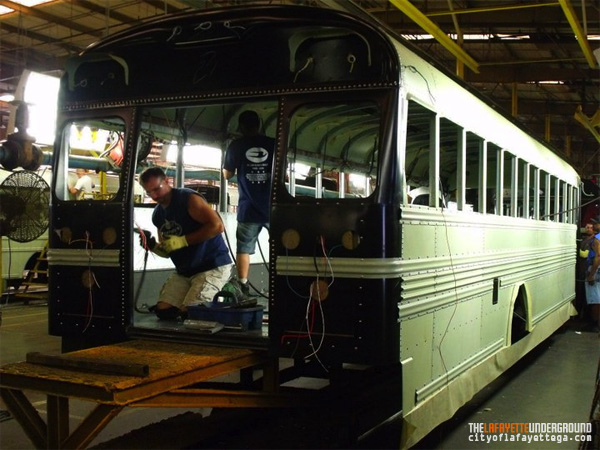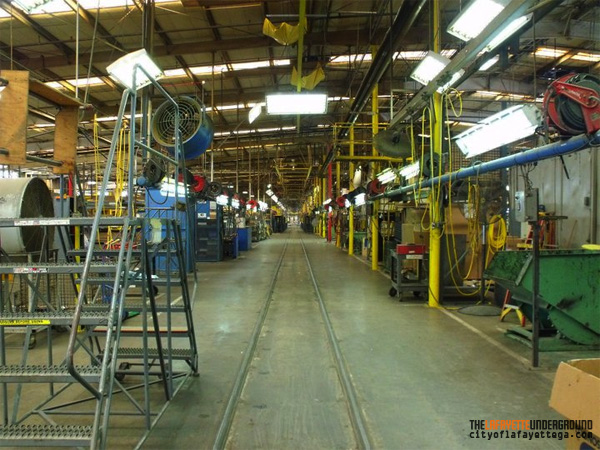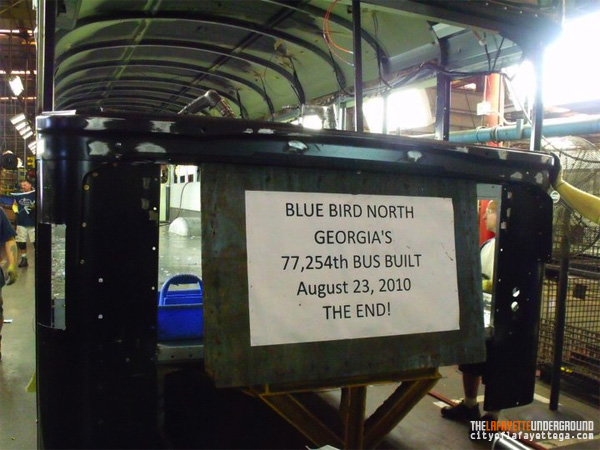09.02

A week ago Tuesday Blue Bird North Georgia completed its 77,254th and final school bus, closing the doors after 23 years of production. The award-winning assembly plant is being consolidated with a larger facility south of Atlanta, pulling millions of dollars and another 350 jobs out of Walker County.
BlueBird has been a vital part of LaFayette and the surrounding area since 1988 when its North Georgia plant reopened after a brief, aborted attempt six years earlier. The company was originally enticed to open in LaFayette through the efforts of Fred Henry and his LaFayette Chamber of Commerce.
In the eighties, school consolidation, higher school spending, new safety regulations, and a mini-baby-boom pushed many school districts to invest in new buses or purchase entire new fleets. At that time the school bus market was strong enough to support six major manufacturers, and BlueBird was one of the strongest with innovative (if expensive) products many considered to be best of class. Strong sales encouraged expansion and development of new sites, including the LaFayette plant.
But overconfidence led BlueBird and the rest of the bus industry to over-expand, resulting in manufacturing capacity well beyond the number of buses being ordered. Economic troubles beginning in 1992 forced half the “big six” manufacturers to close locations, merge with stronger competitors, or go into bankruptcy. BlueBird, by that time operating seven facilities in three different countries, was impacted like everyone else, but managed to finish the decade with only one plant closure in Virginia.
Good management and a focus on quality helped BlueBird survive the downturn, becoming one of only three major American bus manufacturers left by 2005. But the company’s two remaining competitors, IC Corporation and Thomas, were both owned by financially-secure multinational conglomerates producing many different types of vehicles. BlueBird, in comparison, only made school buses for North American customers, prison buses, and RV’s, filed for bankruptcy in 2006, and changed owners six times between 1992 and 2009. (The company’s current owner is the same investment group that ran Chrysler into the ground before selling it at a loss to Fiat.)
BlueBird closed its Mexico facility in 2001, followed by an Iowa plant shutting down in 2002. Those closures were enough to keep the company going until 2007 when it ended RV production near corporate headquarters in Fort Valley, GA and sold BlueBird Canada. That left only two mills to produce all of the company’s products: its original factory in Fort Valley and BlueBird North Georgia in LaFayette.

In 2003 BlueBird North Georgia was on the edge of extinction, unprofitable and building vehicles that regularly failed quality control checks. But new managers, new training, and improved procedures breathed new life into the mill. Within a few years LaFayette’s plant went from the bottom of the heap to being cream of the crop. BlueBird NGA was nominated for Industry Week Magazine’s 10 Best Plants award in 2005 and 2006, winning it in 2007. By then LaFayette was BlueBird’s most profitable operation, and by some accounts was keeping the company afloat.
In recent years BlueBird North Georgia has had a single product, the Vision bus. Fort Valley also builds Visions, alongside the more popular All American transit-style bus, but LaFayette developed a reputation for assembling vehicles with higher build quality than those made at the company’s Fort Valley headquarters. Because of that reputation a majority of school districts requested buses from LaFayette, cutting down profits at the much larger Fort Valley plant even as BlueBird Corp began a multi-million dollar expansion of that facility.
Last year BlueBird managers from Fort Valley made frequent visits to LaFayette, working with local employees to learn the best practices and procedures employed at their most successful plant. In hindsight that should have been a warning sign of the factory’s eventual demise – but at the time BlueBird North Georgia seemed to have a bright future, as both mills were working overtime to keep up with bus orders from stimulus-money-infused school districts all across the country.
In 2010 most schools ran out of stimulus money for extra bus purchases, and many districts had already use stimulus funds to purchase several years worth of new buses in advance. Deepening that hurt, a July 1st change in Georgia law gave local school districts state funding to maintain and refurbish old buses instead of only providing funds for new bus purchases – cutting back the number of vehicle orders originating from BlueBird’s home state.

Those factors, along with the general economic decline, drastically reduced new bus orders during the first few months of 2010. BlueBird responded by reducing North Georgia’s payroll by at least 50, shifting some local management functions to Fort Valley, and advising remaining employees to attend a Roper-sponsored job fair before the factory entered its annual late-summer slowdown. That slowdown turned into a complete shutdown, and on June 24th BlueBird announced its LaFayette facility would cease operations by the end of August.
Last Tuesday marked the end of production and the end of almost every BlueBird job, except for a few key employees left to wrap things up by the end of the year. Some employees left before the shutdown, taking jobs at Roper, Mt. Vernon Mills in Trion (which both had a good summer and added shifts), or other local companies. A handful of BlueBird employees – some of whom worked for the organization more than two decades – are eligible for new jobs (but not transfers) at the Fort Valley plant located three hours away.
Between 200 and 300 BlueBird staffers who stayed through the shutdown are being provided four weeks severance pay, medical coverage through the end of the year, and opportunities to attend school with BlueBird’s assistance. That’s not the most generous severance package ever provided, but for a factory shutdown it’s reasonable and certainly beats showing up at work one morning to find the doors locked forever without warning.
That is, of course, small comfort for the hundreds who are now forced to live on unemployment while hunting for new jobs, trying to decide if they should stick it out and stay in LaFayette or move to a community with better job prospects. It’s also no comfort for other area businesses – everything from bus transporters and diesel-selling gas stations down to the retailers and restaurants patronized by former BlueBird employees – that will be impacted by the closure. Decreased tax revenues and municipal utility profits will give local government entities another excuse to raise taxes on everyone who remains, while unemployed workers will depend further on government help and already-stretched agencies like The Care Mission to help them survive.
 Beyond mere financial ripples, LaFayette and Walker County also lose a business that has long sponsored local schools and sports, has donated time and money to help local agencies (including time wasted on a project for the Sheriff’s Office), and has been a rare source of local pride. BlueBird North Georgia wasn’t just some bus factory, it was the nation’s best bus factory, and it was our bus factory – something employees AND residents could hold up as the best example of what local workers can do with the right opportunity. BlueBird’s closure represents not just a loss of jobs, a loss of economic strength, but a loss of community self-esteem.
Beyond mere financial ripples, LaFayette and Walker County also lose a business that has long sponsored local schools and sports, has donated time and money to help local agencies (including time wasted on a project for the Sheriff’s Office), and has been a rare source of local pride. BlueBird North Georgia wasn’t just some bus factory, it was the nation’s best bus factory, and it was our bus factory – something employees AND residents could hold up as the best example of what local workers can do with the right opportunity. BlueBird’s closure represents not just a loss of jobs, a loss of economic strength, but a loss of community self-esteem.
Since the closure was first announced, LU readers have asked countless times what might be done to stop the closure, how it could have been prevented, and what can be done to prevent future closures of the few employers remaining in LaFayette.
The city and county provided BlueBird with no tax breaks or other incentives, and we’ve seen no evidence that the company ever asked for any. But considering how LaFayette’s City Council responded to a recent request from Roper, they may have decided not to bother. Fort Valley recently sold $4 million in bonds to retain and expand the BlueBird plant and corporate offices located there; LaFayette’s city government, in contrast, would likely have refused to even help with minor infrastructure improvements on the site and is probably salivating over the prospects of buying the empty plant next year and using it for another expansion of the airport or an extra five holes for the golf course.
While giving a company deep tax breaks isn’t always a good idea, Bebe Heiskell and the Walker County government could have given BlueBird a slight reduction in property or inventory taxes. Roper is next door to the BlueBird site and pays no property tax because the land where it sits belongs to the county; giving BlueBird a similar deal would have made keeping the plant open easier – and the amount of taxes paid by the company are trivial when compared to the economic impact of losing its $17-million payroll. Now with BlueBird closed the county has a lose-lose scenario of losing that tax revenue AND all the company’s jobs.
BlueBird has been an exclusive supplier of school busses for Walker County Schools since before the LaFayette plant opened, but in recent years the school board has been buying flat-front All American busses made in Fort Valley instead of ordering the Vision model built here. While there may be certain benefits associated with BlueBird’s All American bus, our school system should have been more committed to buying local products. One school district wouldn’t make or break the company, but using only LaFayette-made busses would have demonstrated support for local jobs and support for the students whose parents worked for BlueBird.
State legislators could also have done more to keep BlueBird running. Georgia’s new law (mentioned above) concerning how school systems are reimbursed for the cost of refurbishing old busses could have been rolled out gradually, with districts in lower-income areas getting the new benefit before everyone else. That would have lessened the sudden blow to BlueBird’s business with school systems in its home state and possibly let the LaFayette plant stay open until the economy recovers, if it ever does.
For all businesses in the state, ending discriminatory incentives for specific businesses would also be a long-term benefit. While companies in certain industries (like television production) enjoy tax breaks and other benefits, companies in other industries (like school bus manufacturing) have to pay their share of taxes along with the taxes that should have been charged to the businesses receiving breaks. That’s discriminatory and violates the core principals of capitalism, especially since most incentives are about winning elections instead of about keeping jobs. This issue has recently gotten more attention across the state, but industries that benefit from the breaks are digging in their heels against any effort to roll back their special tax rates.
Beyond just taxes and economics, there’s also a factor of red tape and convenience. One local business owner put it best, with this recent comment on the LU Facebook:
- “NO real business wants to locate where there is so much back slapping sleep with the enemy so you know where they are kind of goverment. Real businesses want to do business and make money not play footsies with the local crook that happens to get into office. The only reason most manufacturers locate to rural areas is for cheap labor. When that labor gets too expensive or the hassle of dealing with the government is too much they move on.”
And that’s really the rub of it all. With layer upon layer of poorly documented building codes, city and county zoning laws, multiple development and planning authorities within both city and county governments, and a handful of local leaders all expecting to have their butts kissed before projects can begin, it’s little wonder we’ve lost so many major employers in the last ten years. Companies can’t move without running into laws and roadblocks on the city, county, state, and national levels. We can’t do much about state and federal laws, but streamlining, clarifying, and simplifying local laws and bureaucracy would do much to keep existing businesses here and attract in new ones to replace the dozens that have been lost.
When BlueBird first moved into LaFayette, the local atmosphere for business was much different than it is now, with fewer laws, less red tape, and friendly local leaders who welcomed the new company with open arms. (In that era we also had a strong LaFayette Chamber of Commerce working to attract new manufacturers and support existing businesses instead of primarily hosting out-of-county golf tournaments and out-of-state dinners like today’s merged county chamber.) If today’s business-hostile environment had existed then, LaFayette would have never gotten BlueBird, Roper, Barwick, or any other significant employer – and as long as today’s environment exists without a change, more and more companies like BlueBird will pack up and leave town with no replacement in sight.

Considering the national economy and BlueBird’s weak competitive position, it’s probable that none of the steps we’ve suggested would have kept Team North Georgia intact – but that’s no reason not to begin making some of these changes to avoid future closures as large, or larger, than BlueBird’s and to make the area more appealing to other companies that might consider moving in.
Ultimately the best thing that could have been done to keep BlueBird here WAS done: Local workers producing the best product possible even in bad circumstances did more to keep BlueBird North Georgia open than any government action ever could. That quality output (and resulting profitability) kept LaFayette’s facility open years after BlueBird shut down its other plants around the continent. Even the company’s press release commended local workers for “producing a high quality school bus” – high praise from a company preparing to (no pun intended) throw employees under the proverbial bus.
While another plant closure might not have been avoidable, BlueBird’s decision to shutter LaFayette in favor of Fort Valley may come back to bite them later on. A choice made for survival in the short-term could put the entire company out of business when school districts around the country begin receiving lower-quality Fort Valley-produced Vision buses next summer and begin to consider if BlueBird’s products are still worth their premium price.











Bye,Bye KFC. Anyone seen the tumbleweeds blowing down main st yet?
Very good article, thanks.
Sure, Wayne, but when O’Charley’s and Applebee’s come in everything will be okay!
I hope that is sarcasm I slightly detect in that comment Lucas. Yea those restaurants are decent and apart of a large franchise, but do we really want eating establishments that every town gets when alcohol by the drink gets past. O’Charley, Applebee’s, Logan’s, and many others just like them might as well be generic. Which in turn transforms the town into a generic town. I will use highway 2 in Fort O as a comparing point. From LFO High School towards Ringgold, has seen tremendous growth, which I am all for. However, over 70 % of the eating establishments are cookie cutter style restaurants. They are basically fast food restaurants with a tweak. It takes your food a little longer to get to you and the availability of adult beverages. Take those two things away and all you have is another fast food or greasy spoon. I just think we could come up with different restaurant idea. Before long, if Walker County is truly growing and we get the Applebee’s and/or Chili’s of the world, we will look just all the other towns on US27. I’d just like to see a restaurant like Chow-baby, Lettuce Surprise You, or some form a Japanese steak house. With Burger King, KFC, and even Huddle House as examples of the success or lack there of in LaFayette, beer and wine by the drink isn’t going to bring anybody to town.
Yes paw75, my comment was dripping with sarcasm. There are many in this town who continually argued that we need alcohol by the drink to draw in those big restaurants, totally ignoring factors like economic strength and location. Now that abtd is legal, we’ll see how many of them rush to fail along with the few places we have left.
let’s be honest. the salad days ain’t coming back. i don’t think you’re going to see a replacement for bluebird, regardless of city gov’t changes. the gap in the educational level and preparation of young people entering the workforce is too large. lafayette high school has been crappy for a long time, and the dropout rate is through the roof, still. one day “Roper Tech” may not be a viable option. then what? fix the schools, fix the mindset, fix the city gov’t. tall order, if you think about it.
I wouldn’t call a 53 to 55% drop out rate “through the roof”. I’d leave that to anything above 77%. I would call it alarming since I do work with adults and students which find themselves on the high side of that statistic.
you wouldn’t call a high school dropout rate of 55% through the roof? i think that’s a disastrous statistic. and, the truth is, it’s actually higher than that. those folks fudge the numbers; they always have. it’s closer on 60%.
I would definitely call it through the roof…when more than half the kids don’t graduate that’s through the roof and very sad. I don’t care who they are comparing to. They aren’t getting them ready for work or for anything else and will just end up more kids living off of the government or in jail.
The drop out rate at Lafayette is 23.6 %. I wish it were lower, but it sure isn’t “over half”
I am not sure where you got your figure LHS dad. That might be what they are hoping for, or it might be what they construe it too, but last I checked, in the last year or so, it was over 50%. Gov’t data says so. And if they’ve dropped it down that far in just a year or two, who are they pushing out or keeping out of highschool so they can clean up their graduation rate? Can we say grade 8.5?
Well, I went all the way through, from Fortune to LHS, and I’m dumber than a sack of hammers. I am living proof that the school system in walker county sucks ass.
I remember the first and last times that me and my Dad with friends had rode from Meyersdale, PA to LaFayette, GA and picked up new buses from there. The last North Georgia plant bus I drove was a 54 passenger school bus with ours and another bus, all bound for the Blue Bird dealership near Pittsburgh, PA in 1998. I can still remember the first and only time we visted any of the Blue Bird plants, that was in 1990 at Buena Vista, VA. That plant is also gone.
What you have described is a troubling trend not just for our localities but across the country where wasting taxpayer monies and passing stupid regulations to drive job-making businesses away from America to China, India, etc.
no lets charge some people that don’t live in this god forsaken hell hole for some thing they were not even at the location for which they were said to be but were not even in the state of georgia and try to make it stick . this is a bunch of drumed up charges on someone who was not in the state let alone walker county .some of the police know what this about ?
TO FORMER BLUE BIRD LAFAYEETE WORKERS.THE GOOD NEWS IS THE NEW VOLKSWAGON PLANT IN CHATTANOOGA.I WOULD BE HAPPY.WOULD YOU? walker county loss is Hamilton county gain.